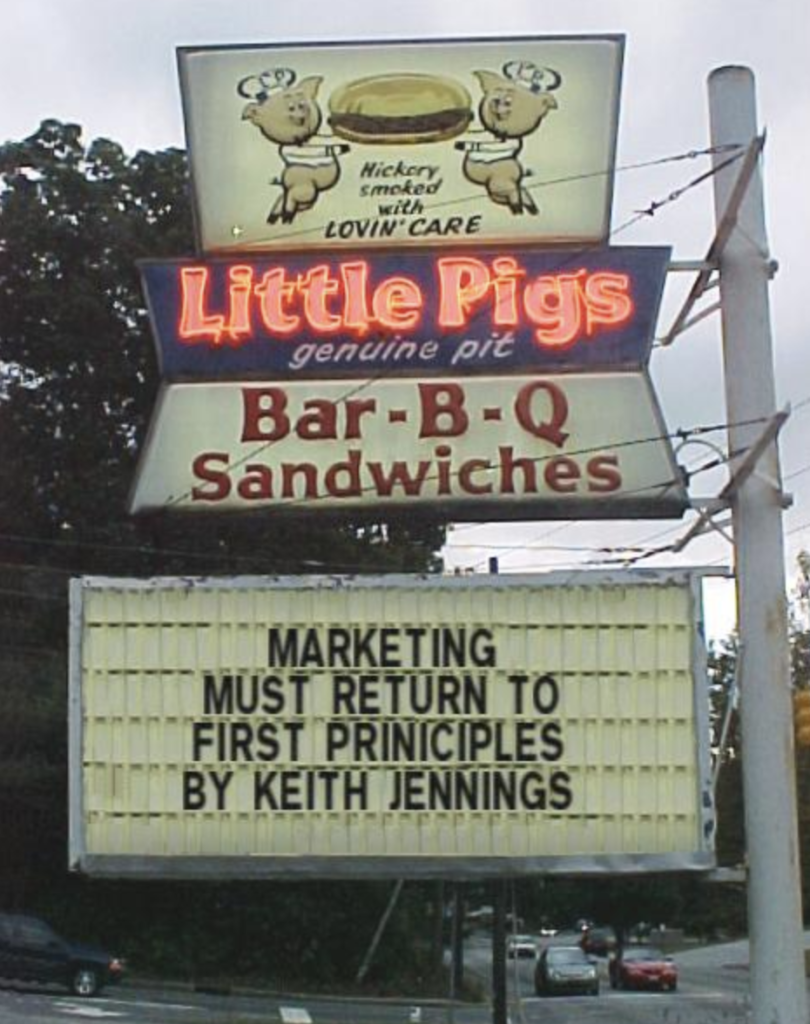
by Keith Reynold Jennings, {grow} Contributing Columnist
“Marketing has lost its way.”
I’ve heard Mark Schaefer say this on more than one occasion. He said it again during the most recent Uprising Online gathering. And I couldn’t agree more.
In studying the greatest innovations in marketing over the past 50 years, I discovered that many came from disciplines other than marketing. For example, economists have been significant contributors to marketing’s advancement.
Chief Marketing Officers have the lowest tenure and highest turnover in the C-Suite. Isn’t it ironic that the discipline skilled in branding, loyalty, and sales has the biggest branding, loyalty, and sales problem with CEOs?
A few years ago, Lola CEO Mike Volpe tweeted, “At dinner with 10 CMOs. Biggest issue is that it is very difficult to find amazing people to hire. Most marketers are average at best.”
When I asked around about this sentiment, both marketing and non-marketing executives agreed.
So what does this mean for marketers?
It means it’s time to get back to the fundamentals. Pitching, hitting, and fielding. Blocking and tackling. Wax on, wax off. You name it.
And the way to do this is through what’s known as “first principles” in mathematics, physics, and philosophy.
In this article, I want to introduce you to this highly effective approach to innovation and encourage you to start applying it in your career, business, and market.
Your Brain Plays Tricks On You
I could bore you with a Wikipedia-like explanation of first principles. But I won’t. To introduce you to the concept, I’d like to throw you into a zombie apocalypse scenario.
Are you in? Then, let’s go!
Imagine you have just arrived at a dilapidated barn on an abandoned farm.
In the barn, you find an old John Deere tractor, a motorcycle with flat tires and an array of farm tools. Not too far from the barn, under a clump of trees, is a rusting 1966 Mercury M-100 truck with broken windows.
It’s in the early stages of a blizzard. And, to make it really interesting, the zombie apocalypse has begun. Hundreds of zombies are heading toward the farm you’re on.
You have about 48 hours to get out of there alive or you will either freeze to death, starve to death or be surrounded by zombies and eaten.
What are you going to do? How will you escape and survive?
Well, the first problem you have to overcome has nothing to do with the scenario at hand.
It has to do with your brain.
You have to overcome an anchoring effect, which essentially is a cognitive bias that causes you to rely too heavily on the initial information presented when making decisions.
In other words, your brain is trying to figure out what it can do with a tractor, truck, motorcycle, and farm tools. It’s begging for more details. Do these vehicles work at all? What farm tools, exactly?
The second obstacle you have to overcome is the default way in which your brain reasons, which is by analogy. “This situation appears to be like another situation you or someone you know has encountered.”
Which means you unconsciously focus on what’s known and familiar, rather than what’s possible.
There’s nothing wrong with reasoning by analogy. It’s simply not adequate in complex scenarios like the dynamics of your market or a zombie apocalypse during a blizzard.
The thing you most need, in complex situations, is first principles thinking.
To Understand First Principles, Think Lego

At a high level, this approach to reasoning requires you to break things down to their fundamental truths or ingredients (i.e. first principles), then reassemble them in ways that offer the highest probability of success.
And that’s one of the keys to first principles. It deals with possibilities and probabilities. It’s not limited by the dualistic thinking of good/bad, right/wrong, this/that.
At that barn, you have possibilities. The real question is which option offers you the highest probability of survival.
A great way to think about first principles is with Lego.
Imagine buying a child a Lego set of Star War’s Millennium Falcon. When they open the box, all the pieces are packaged in groups of colors and styles. There’s a step-by-step instruction booklet for them to follow.
They can certainly build the Millennium Falcon. But they don’t have to. They have 7,541 individual Lego pieces to work with. They can build whatever they want with those pieces.
Those individual Lego bricks are the first principles — the core building blocks of Lego.
Mixed martial arts is another terrific example of the power of first principles. The world is full of philosophies and styles: karate, judo, kung fu, taekwondo, ninjitsu, jujitsu, etc.
Through first principles thinking, Bruce Lee and others began identifying and blending fighting techniques and styles based solely on what worked in real-life combat situations. The result is what we call mixed martial arts today.
It’s Time To Deconstruct Marketing
So let’s return to the barn.
It’s snowing hard now. You’re starting to feel weak from exhaustion and lack of food. Your fingers and toes are numb from the bitter cold. The zombies are getting closer.
Based on what we’ve covered so far, how will you approach this situation using first principles? How can you reduce the resources you have to their basic building blocks?
To think through this scenario using first principles, disassemble the tractor, truck, motorcycle, and even the barn itself in your mind. Now, you have all the parts and pieces, like Lego bricks, to work with.
Could you construct some sort of snowmobile? What about a makeshift mini-tank? Or weather-proof body armor?
The big idea with first principles is this: We must learn and adapt to our environment through understanding, not through assumptions or copying.
When Mark Schaefer says, “Marketing has lost its way,” I think he’s seeing too many marketers trying to copy what other marketers are doing, rather than doing the hard work of truly understanding their customer or client.
It’s as if marketers are building Lego kits using a step-by-step instruction guide, rather than looking at all the resources they have and figuring out what’s actually useful, remarkable, and valuable.
It’s time marketers leverage the innovative power of first principles. It’s time to disassemble all the tools and resources we have as marketers in order to find new, more effective ways to serve our customers, as well as our organization.
Applying First Principles Thinking To Your Marketing
Let’s look at a couple of things you can do today to leverage the power of first principles.
First, start by understanding the first principles of marketing in your market. I recommend starting with a deep understanding of your customers or clients, as well as your product, pricing, placement, and promotion.
What are the core building blocks driving awareness, engagement, and activation?
If you’re a service business, focus on the core building blocks of your customer experience, costs, and convenience.
Second, challenge every assumption you have about the people you serve. Your data is likely half-right. Your customers are likely more diverse, informed, and in control than your team thinks.
As you start using first principles thinking, you’re in great company. It is what Elon Musk uses at Tesla and SpaceX to do what industries have said can’t be done for decades. It’s what Charlie Munger uses at Berkshire Hathaway to understand the dynamics of complex markets. Even Aristotle used first principles!
Imagine a future in which marketers are highly sought-after advisors to CEOs and founders because of their ability to effectively overcome obstacles and innovate.
I believe first principles are a big idea and a powerful tool too few marketers use.
Together, let’s change that!
If you want to go deeper with first principles, check out these terrific resources:
- First Principles: Elon Musk on the Power of Thinking for Yourself by James Clear
- First Principles: The Building Blocks of True Knowledge by Shane Parrish
- Reasoning from First Principles by Mike Lamb
 Keith Reynold Jennings serves as vice president of community impact for Jackson Healthcare and an advisor to goBeyondProfit. Connect with Keith via Linkedin and his monthly letter, Root Notes.
Keith Reynold Jennings serves as vice president of community impact for Jackson Healthcare and an advisor to goBeyondProfit. Connect with Keith via Linkedin and his monthly letter, Root Notes.


